
2023-11-14
On the morning of October 10, 2023, local time, 2023 ICA International Conference on Archives was officially opened in Abu Dhabi National Exhibition Center, UAE. Organized by the International Council on Archives (ICA), the conference, with the theme of “Enriching the Knowledge Society”, consists of five themes and 47 topics, attracting more than 3,000 experts and scholars in the field of archives from more than 135 countries to attend the event. A total of 23 faculties and students from Renmin University of China participated in the conference, giving a number of paper presentations, flash talks, and poster presentations during the conference.
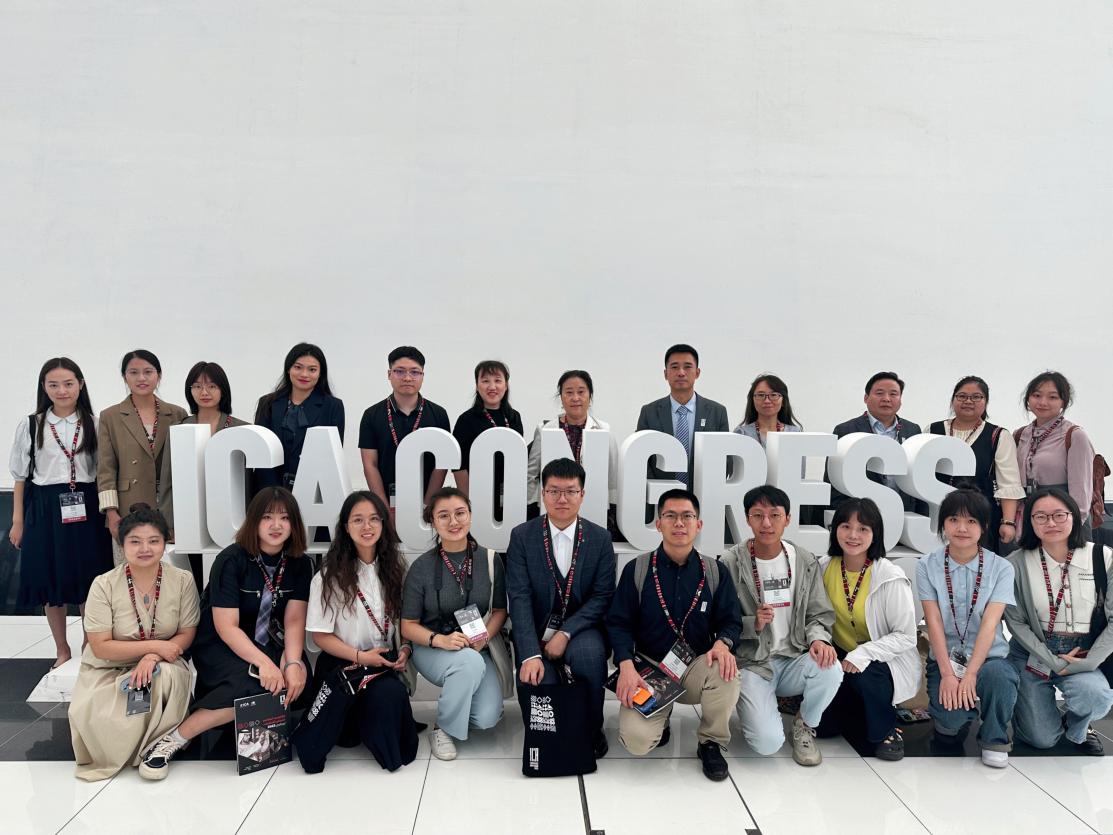
II. Conference Site
1. Paper presentations
Digital Humanities Higher Education: China’s “Four Carriages” Experience
Digital Humanities Higher Education: China’s “Four Carriages” Experience was co-authored by Prof. Huiling Feng, Assistant Prof. Tianjiao Qi, Prof. Jihong Liang, and Prof. Yuenan Liu at Renmin University of China (RUC), with Prof. Zhiying Lian presenting on behalf of all authors. Renmin University of China (RUC) has the only complete digital humanities higher education system in mainland China, and the paper mainly shares its unique “platform-research-teaching-practice” four-pronged digital humanities talent cultivation model. At the teaching level, RUC has led the formation of a multi-faculty interdisciplinary cultivation mechanism and launched a series of digital humanities-related courses and degrees; at the practical level, RUC encourages and support students to apply what they have learned to real projects, realizing the perfect combination of knowledge and practice. This “Four Carriages” model not only promotes the overall development of teachers and students, but also provides a solid foundation for future research and development in the field of digital humanities.
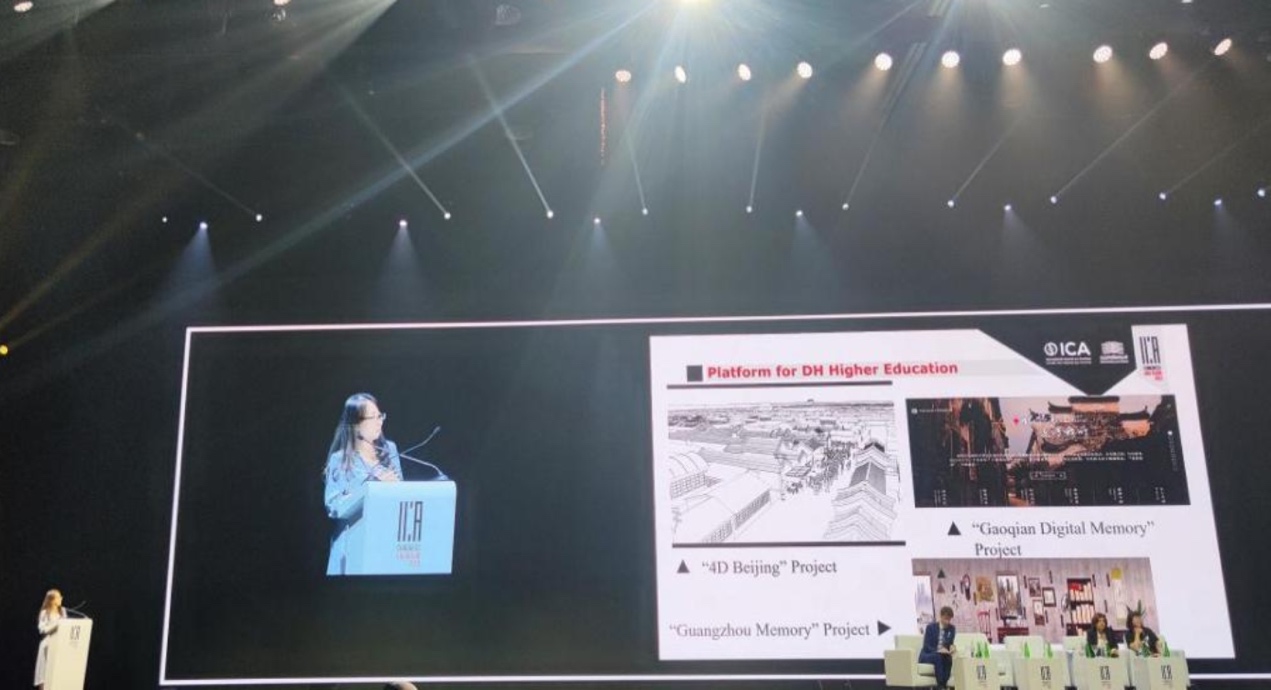
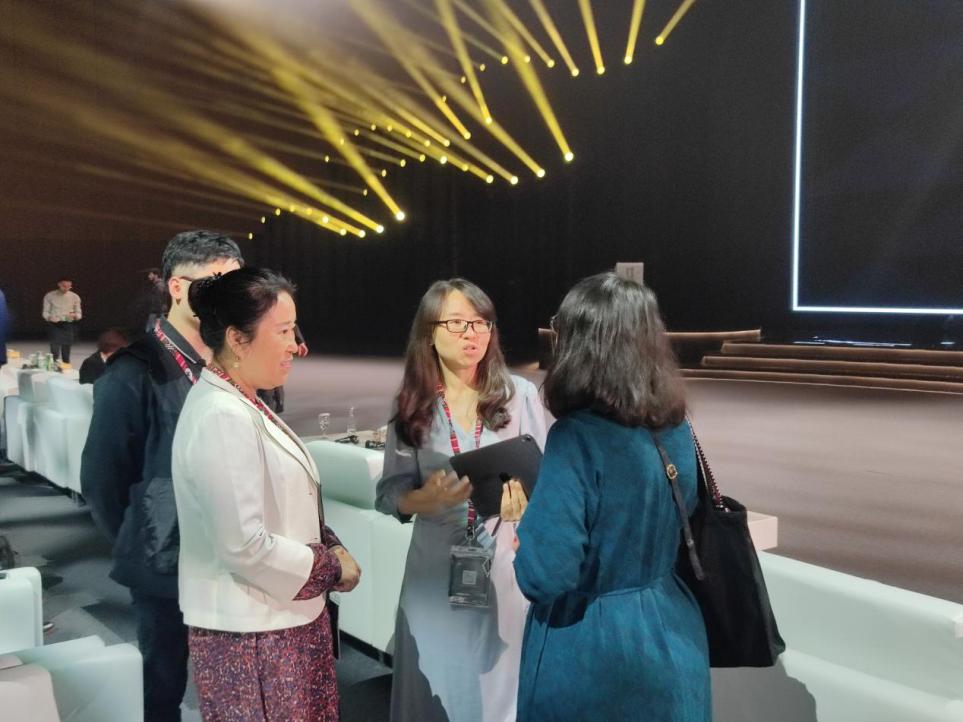
Design and application of a lightweight digital resource organization and presentation method: Based on MPLP Concept.
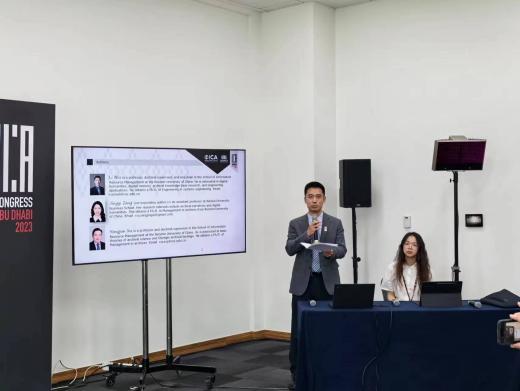
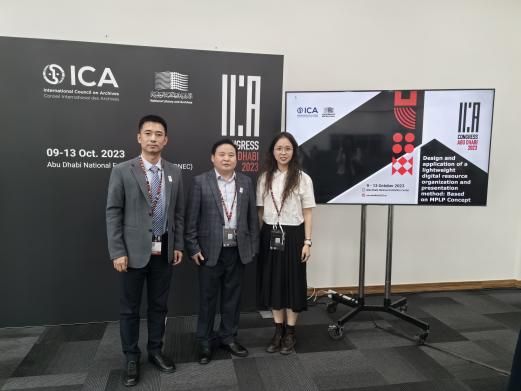
Prof. Li Niu gave a paper entitled Design and application of a lightweight digital resource organization and presentation method: Based on MPLP Concept. The co-authors of the paper are Dr. Jingyi Zeng from Nankai University and Prof. Yongjun Xu from Renmin University of China. The paper constructed a MPLP-C model and applied it in the construction of China’s archival academic network, which effectively promoted academic exchanges in the field of archives.
The construction of knowledge graph of the archival resources carrying urban memory
Prof. Zhiying Lian, doctoral student Yi Chen and master’s student Hanhan Sun gave a presentation entitled The construction of knowledge graph of the archival resources carrying urban memory, which adopts a top-down approach to construct a knowledge graph of archival resources of urban memory. The study creates an ontology of archival resources carrying urban memory and constructs a knowledge graph of the archival resources carrying urban memory by taking the archival resources of Shenzhen’s reform and opening-up as an example for empirical research. This knowledge graph not only realizes the links between archival resources and content entities, as well as the semantic links between archival resource contents, but also provides application services such as entity retrieval, relationship retrieval, knowledge visualization and intelligent Q&A.
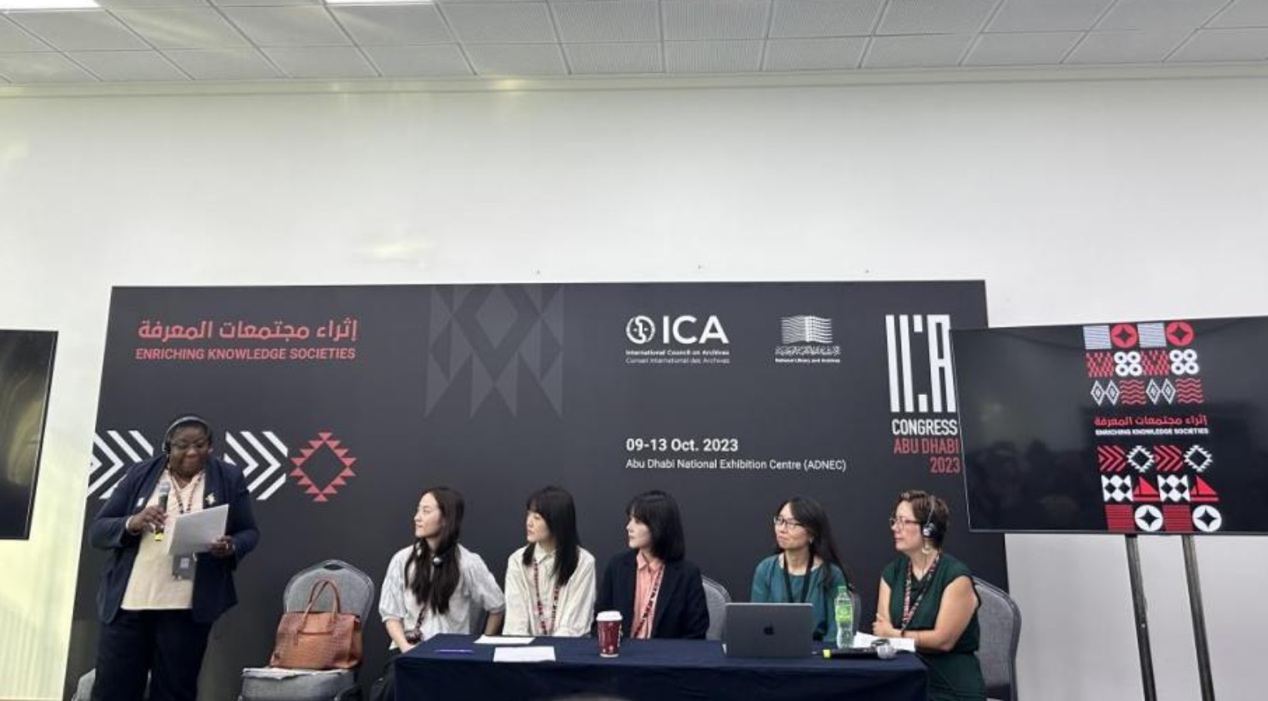
Research on the Optimization Path of archival crowdsourcing from the perspective of archival advocacy
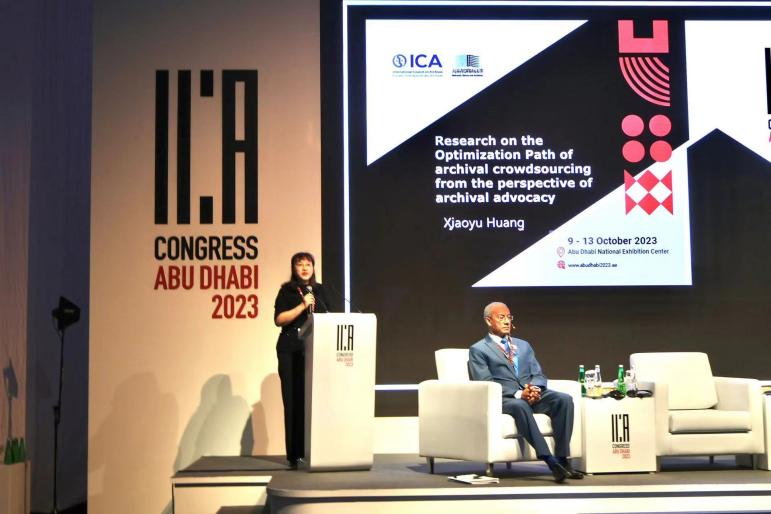
Prof. Xiaoyu Huang and her doctoral students gave a paper report entitled Research on the Optimization Path of archival crowdsourcing from the perspective of archival advocacy. Focusing on the theoretical frontiers of archival advocacy and based on rich domestic and international practice cases, the report analyzes the status quo and deficiencies of archival crowdsourcing in archives at home and abroad from the perspective of archival advocacy and elaborates the causes of the problems. On this basis, the report puts forward the optimization path of crowdsourcing in archives at home and abroad from the perspective of archival advocacy, which provides theoretical references for archives at home and abroad to set up the awareness of advocacy and optimize crowdsourcing projects.
Approaches to Archivization Protection of Chinese Traditional Villages: from Documentation to Digital Memory Construction
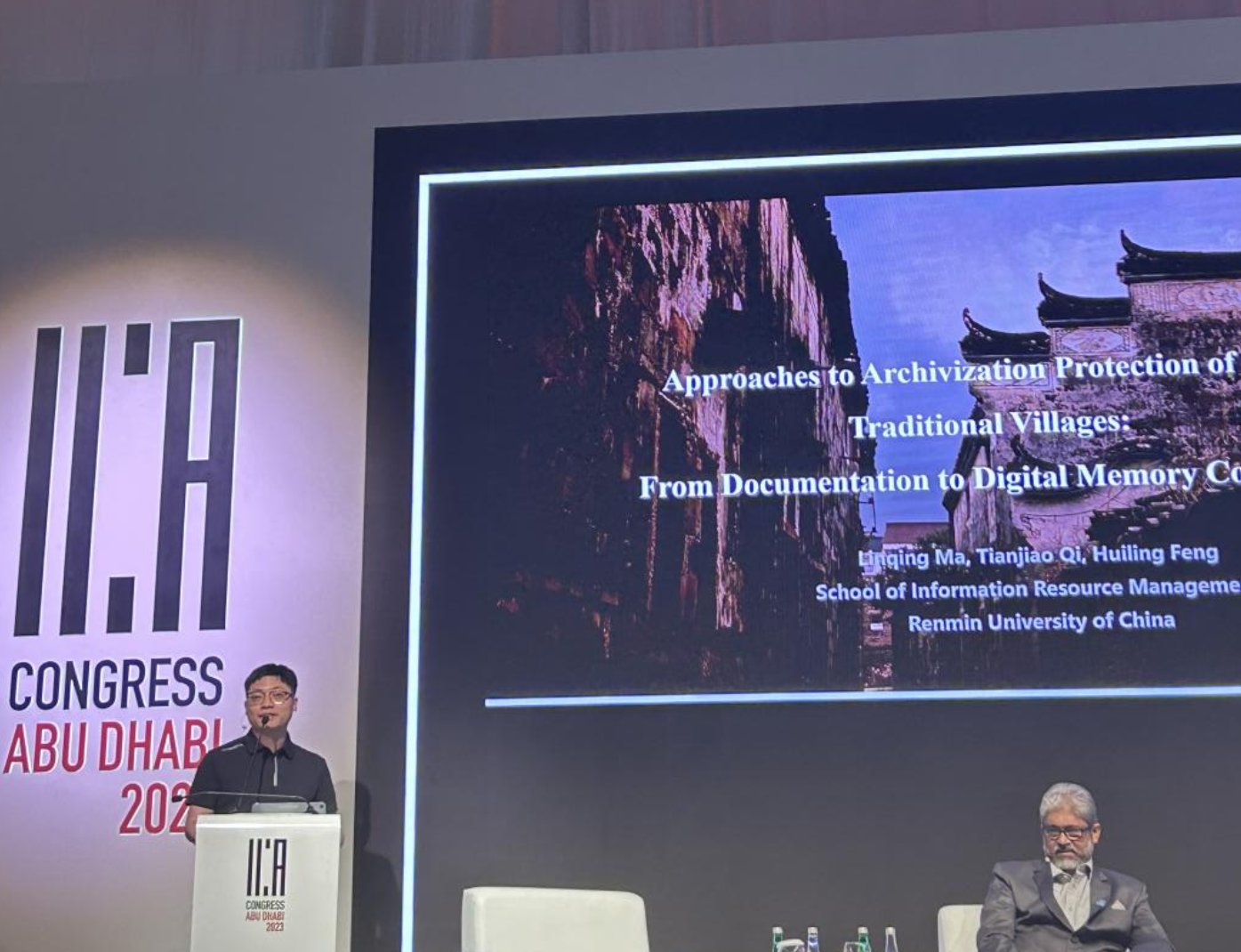
Associate Professor Wenhong Zhou, on behalf of the team of Associate Professor Linqing Ma, Assistant Professor Tianjiao Qi and Professor Huiling Feng, presented a paper entitled “Approaches to Archivization Protection of Chinese Traditional Villages: from Documentation to Digital Memory: Construction”. The study explores the concept and significance of archivization protection of Chinese traditional villages from the perspective of cultural heritage memory. Taking the Taizhou Traditional Villages Digital Memory Platform Project as an example, the study analyzes the pathway from documentation to digital memory construction, and explores the role that archives should play in the protection of traditional villages.
Key issues in social media archiving based on interviews with state archives in China
Master’s student Lijun Wen gave a thesis presentation on behalf of the research team in the Sustainable Archival Knowledge special session entitled Key issues in social media archiving based on interviews with state archives in China. Associate Professor Wenhong Zhou led PhD student Yiwen Su and Master’s student Lijun Wen to conduct the research, which extracted key issues in social media archiving based on interviews with state archives in China. During the exchange session, Associate Professor Wenhong Zhou and PhD student Yiwen Su further introduced the team’s research progress on social media archiving in other Chinese subjects.
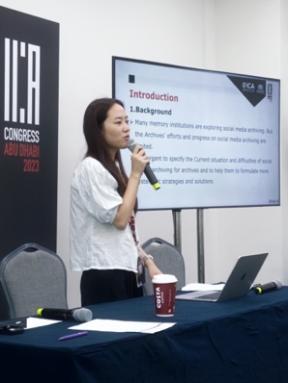

Archival Institutions’ Participation in Open Government Data in China and its implications
Archival Institutions’ Participation in Open Government Data in China and its implications was supervised by Associate Professor Wenhong Zhou, and co-authored by Dr. Linxu Dai, Master’s students Yifan Wu and Pengchao Liu from the School of Information Resources Management, and Xiaofang Xiong, a 2020 undergraduate student from Sichuan University, in the keynote forum “Documenting the Government’s Processes”. The paper explains that in the context of global big data technology advancement and government data governance construction, it is of strategic significance for archival institutions to actively participate in the opening of governmental data. The situation of open archival data; the access situation of open data of archival institutions in three aspects. Based on the above survey, the effectiveness and shortcomings of China’s archival institutions’ participation in open government data are clarified, and optimization strategies are proposed: firstly, a sound policy system is established; secondly, the collation and analysis of archival data are strengthened, and a list of priority open data is formulated; thirdly, the application of digital technology is used to improve the quality of archival data resources; and fourthly, measures are taken to guide the public to access to open archives.

The Realistic Dilemma and Path Choice of “Over-Recording or Memorizing” in the Digital Era
Jiaqing Long, a PhD student of Class 2021, shared his dissertation The Realistic Dilemma and Path Choice of “Over-Recording or Memorizing” in the Digital Era with Prof. Yongjun Xu, which reviewed the background and practical reasons of the “Right to be Forgotten”. The paper reviewed the background and practical reasons for the “Right to be Forgotten”, pointed out the possible impacts and influences from the perspective of archive management, and pointed out the solutions in terms of archive categorization, appraisal of archive value, and retention period of documents.

2. Flash Speech
Digital storytelling and the representation of urban memory
Digital storytelling and the representation of urban memory is a collaborative work between Prof. Zhiying Lian and Prof. Huiling Feng, and Prof. Zhiying Lian presented the paper on behalf of all the authors. Taking the “Beijing Memory Project” of Renmin University of China as an example, the paper discusses the forms, effects and challenges of applying digital storytelling to the reproduction of urban historical memory, and provides suggestions for the application of digital storytelling in urban memory projects initiated by China Archives, so as to further utilize the role and value of these urban memory projects in the promotion of cultural self-consciousness and urban identity. The role and value of these urban memory projects in promoting cultural consciousness and urban identity are further utilized.
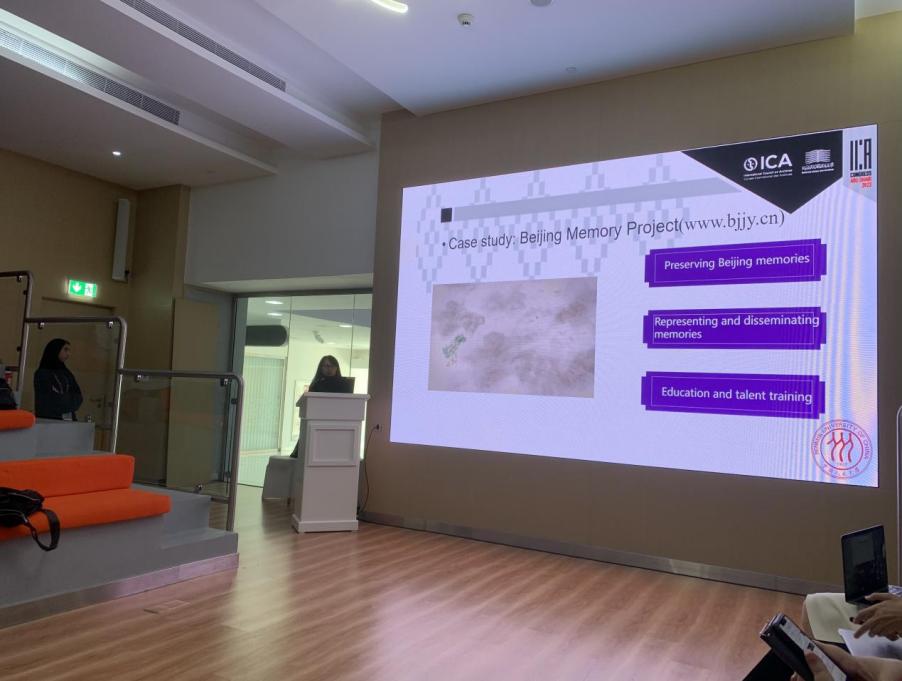
Records Knowledge Maps:‘Context is Everything’-A Case Study of Nuclear Power Enterprise
Dr. Jingyi Zeng, Assistant Professor of Nankai University, gave a presentation entitled Records Knowledge Maps : “Context is Everything”-A Case Study of Nuclear Power Enterprise in Lightning talk Session 2. Nuclear Power Enterprise. Co-authors of the paper include Prof. Li Niu from Renmin University of China and Mr. Jiefeng Qiu and Mr. Zhe Li, Directors and Section Chiefs of Fuqing Nuclear Power Co. The paper constructs a context-embedded document knowledge model and applies it to the construction of nuclear power document knowledge map, which effectively promotes the knowledge management of nuclear power enterprises.
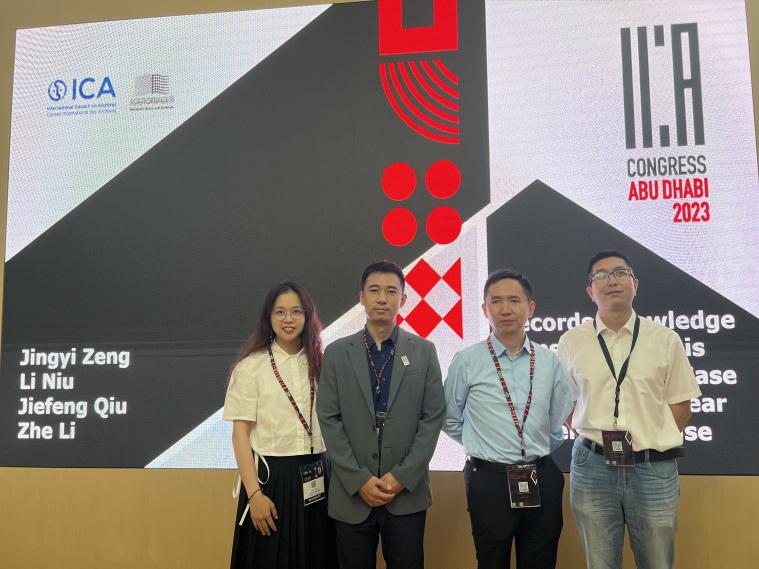
Linguistic Turn and Reflection of “Archive” in Digital Humanities Research
PhD student Jiaqing Long reported on his paper Linguistic Turn and Reflection of ‘Archive’ in Digital Humanities Research, which focuses on the changes that have occurred in the digital humanities field as a result of the ‘archival turn’ and points out the differences in linguistic contexts. “The paper focuses on the changes that have occurred in the field of digital humanities in the ‘archival turn’ and points out the differences in linguistic contexts; the study employs a case study and content analysis methodology to code and analyze more than 40 international archival digital humanities projects, and discusses the characteristics of the turn in three different categories.
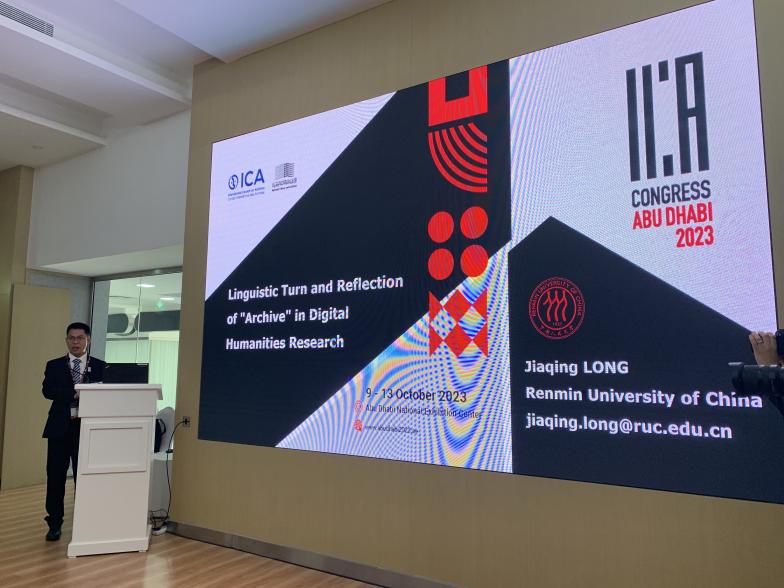
The Regulation and Control of Public Behaviors in the Activities of Archival Crowdsourcing
Doctoral student Ruohan Guo gave a presentation entitled The Regulation and Control of Public Behaviors in the Activities of Archival Crowdsourcing. Co-authors of the paper include Prof. Yongjun Xu, PhD student Jiaqing Long, and master’s student Sijia Lu. Ruohan Guo focused on five sections: Introduction (Definition of Crowdsourcing and its Impact on Archival Work), Global Archival Crowdsourcing Project, Sheng Xuanhuai Archival Crowdsourcing Project, The Role of the Public in Archival Crowdsourcing, and The Regulation and Control of Public Behaviors in the Activities of Archival Crowdsourcing.
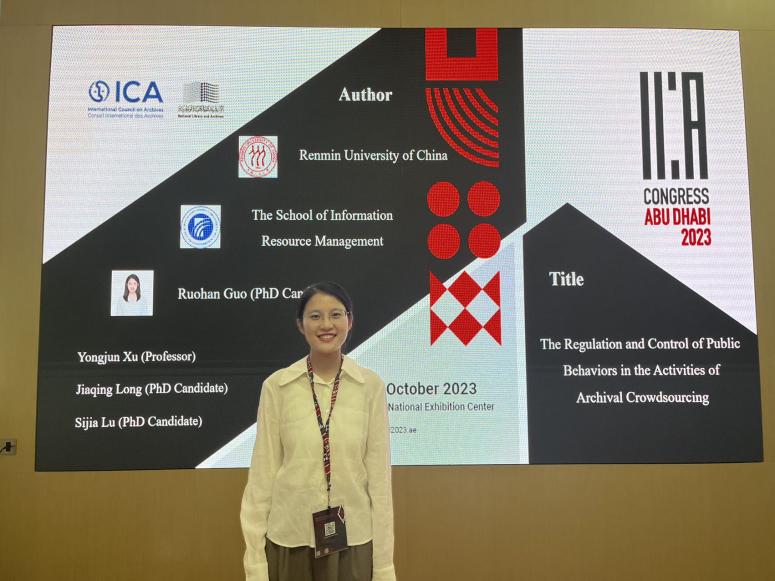
Copyright Risks and Countermeasures in Archival Digitization — Taking Chinese Practice as an Example
Master’s student Sijia Lu gave a conference presentation entitled Copyright Risks and Countermeasures in Archival Digitization — Taking Chinese Practice as an Example, which was authored by Prof. Congjun Xu, master’s student Sijia Lu, Doctoral student Ruohan Guo. Taking Chinese Practice as an Example, the paper analyzes the copyright risks in archival digitization from the perspective of whole-process management, and puts forward countermeasures to deal with the copyright risks in the pre-digitization stage (preparation stage), mid-stage (reproduction, storage and development), and post-digitization stage (dissemination and utilization) respectively.
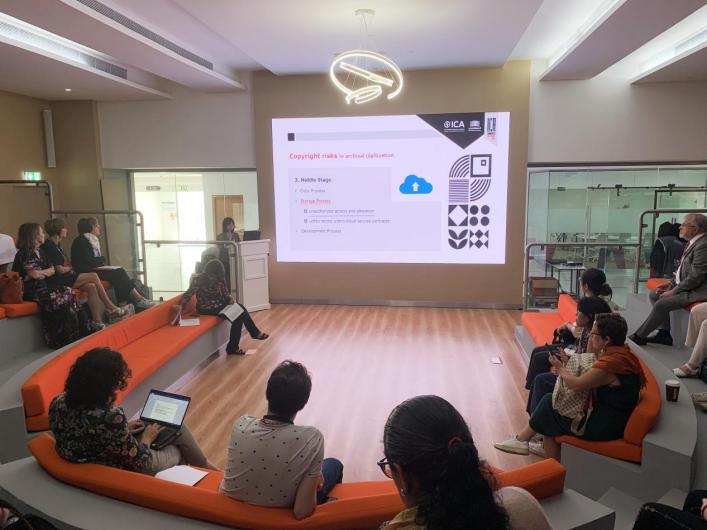
3. Poster display
The influence of village-level archives on China’s rural vitalization and its mechanism empirical evidence from five administrative villages
Professor Yongjun Xu and Associate Professor Xiaoshuang Jia presented a poster on The influence of village-level archives on China’s rural vitalization and its mechanism empirical evidence from five administrative villages on October 10. They engaged in poster exchanges centered on the theme of ” The influence of village-level archives on China’s rural vitalization and its mechanism,” introducing the process and results of the research team’s field survey of five typical administrative villages in China from December 2022 to February 2023. They addressed core questions such as “What is the relationship between village-level archives and China’s rural vitalization?” “What impact do village-level archives have on China’s rural vitalization?” and “How do village-level archives play a role in China’s rural vitalization?” The research attracted the attention of scholars present, who actively interacted and discussed with the two presenters. The presenters also shared their findings, indicating that village-level archives and rural vitalization have a mutually influential and promotive relationship, that the impact mechanism of village-level archives on rural vitalization is based on the unique characteristics of village-level archives, and that the positive impact of village-level archives is reflected in five dimensions: industrial structure upgrading, ecological environment protection, spiritual civilization construction, rural public affairs governance, and folk cultural life.

The Protection and Inheritance of Archival and Cultural Heritage Empowered by Digital Humanities——Taking the Heritage of the Beijing-Hangzhou Canal as an Example
Doctoral student Jiaqing Long presented a poster titled Preservation and Inheritance of Archival and Cultural Heritage Empowered by Digital Humanities – Taking the Heritage of the Beijing-Hangzhou Canal as an Example, which he co-authored with Professor Huiling Feng. Based on the document resources of the Beijing section of the canal, they developed digital humanities applications and attempted digital reconstruction design using the historical landscape approach (HUL).
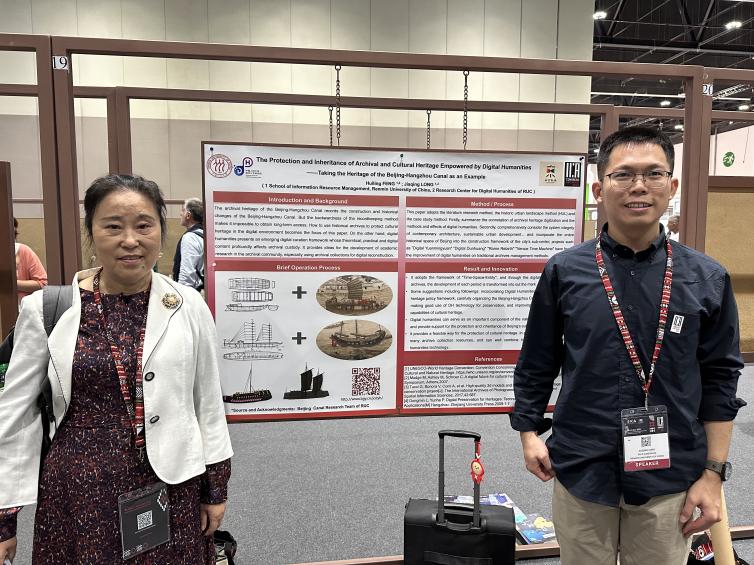
In addition, Jiaqing Long also presented a poster titled The Paradox of the Right to Memory and the Right to be Forgotten in the Digital Era and Coping Strategies, which he co-authored with Professor Yongjun Xu and Master’s student Jiajie Pei. Based on a dual perspective of law and information resource management, they reviewed the theoretical basis and subject responsibilities of the rights to memory and to be forgotten, identified four rights paradoxes related to memory and forgetting in the digital era.
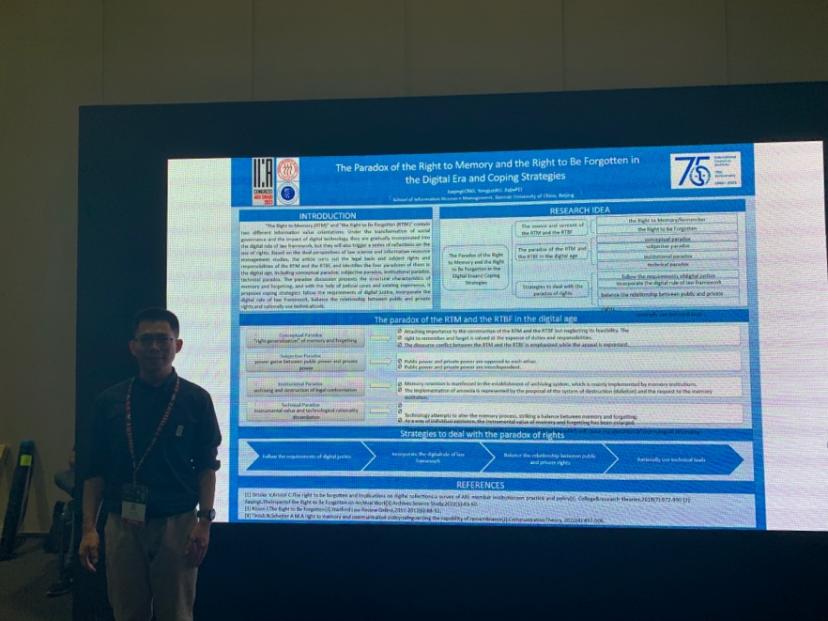
The Construction of Collective Memory in Archival Narrative: Theoretical Logic and Practical Landscape
Professor Yongjun Xu and doctoral student Ruohan Guo presented a presentation titled The Construction of Collective Memory in Archival Narrative: Theoretical Logic and Practical Landscape, which focused on the construction of collective memory in archival narratives. The presentation mainly discussed the theoretical logic of “power reflection” as orientation, “reality center” as goal, “meaning interpretation” as process, and “social shaping” as result, as well as the practical landscape implied by the behavioral logic of “recording (the traces of practical activities), selection (the choice of key symbols), integration (the concatenation of narrative clues), and transmission (the solidification of collective identity)”.
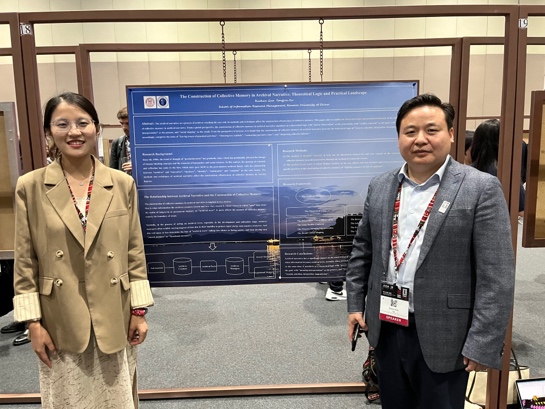
Ecological Priority and Artistic Presentation——A Comparative Study of Architectural Design Characteristics of Archives in China and Abroad
Professor Xiaoyu Huang and doctoral student Yi Zhang introduced the design characteristics of Chinese and foreign archives in the form of posters with the title of Ecological Priority and Artistic Presentation: A Comparative Study of Architectural Design Characteristics of Archives in China and Abroad. The poster pointed out that although the development process in China and abroad is slightly different, “ecological priority” and “artistic presentation” are the common characteristics of architectural design in Chinese and foreign archives.
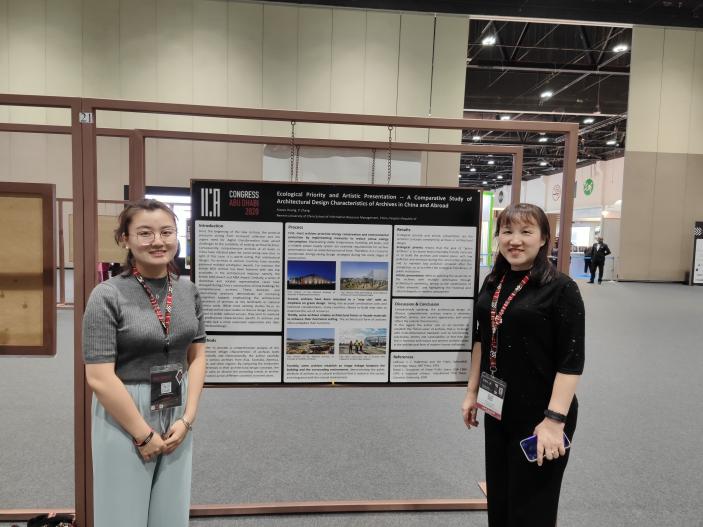
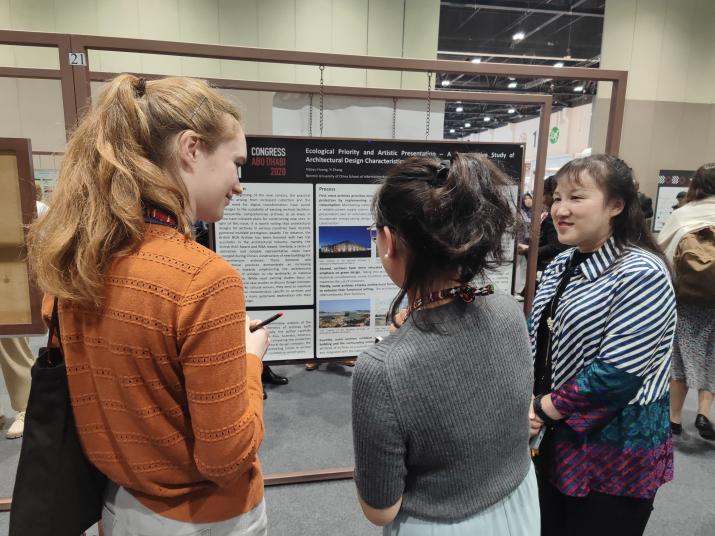
Integrating ERMS and Digital Archives System in Government Cloud——The Trend in China
PhD student Siyuan He presented his poster titled Integrating ERMS and Digital Archives System in Government Cloud – The Trend in China, which was jointly completed with Professor Yuenan Liu. The poster focuses on the practical progress of China’s construction of an integrated electronic document management system (ERMS) and digital archives system (DAS) based on government cloud, and analyzes the objectives, main stages, construction methods, expected results, and security issues of the ERMS-DAS project. It also extends to discuss the participants’ enthusiasm and ideas, the gap between plans and implementation, and so on. During the presentation, discussions were held on the practical progress of the ERMS-DAS project, system suppliers, the disposal and destruction of archives, and the theoretical model construction process.
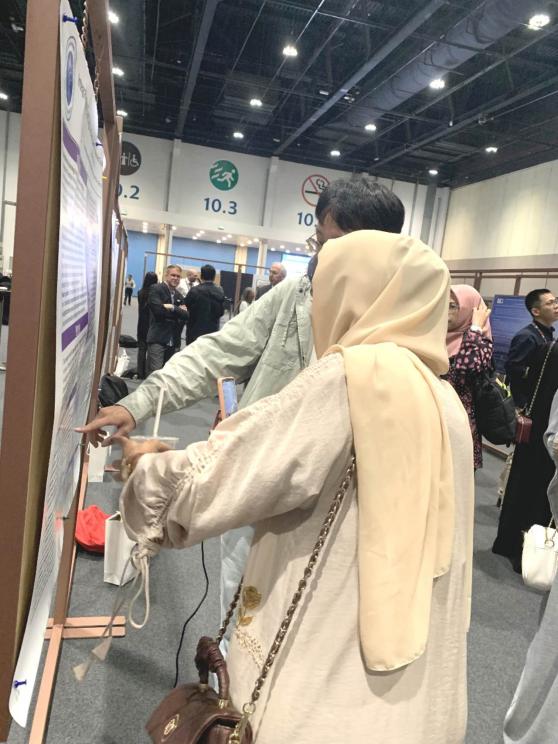
Awakening Vernacular Memory: A Study of Deconstruction and Living Heritage for Chinese Local Gazetteers
Doctoral student Chi Jin and Anrunzhe Li jointly presented a poster titled Awakening Vernacular Memory: A Study of Deconstruction and Living Heritage for Chinese Local Gazetteers. The poster introduced a unique documentary literature – Chinese local gazetteers, and proposed a dual-track and dual-library research framework based on the characteristics of Chinese local gazetteers by combining relevant theories such as archival science, digital humanities, and social computing. This framework transformed research on Chinese local gazetteers into knowledge organization research centered on local knowledge and its carriers, thereby further unlocking the diverse values of local gazetteers.
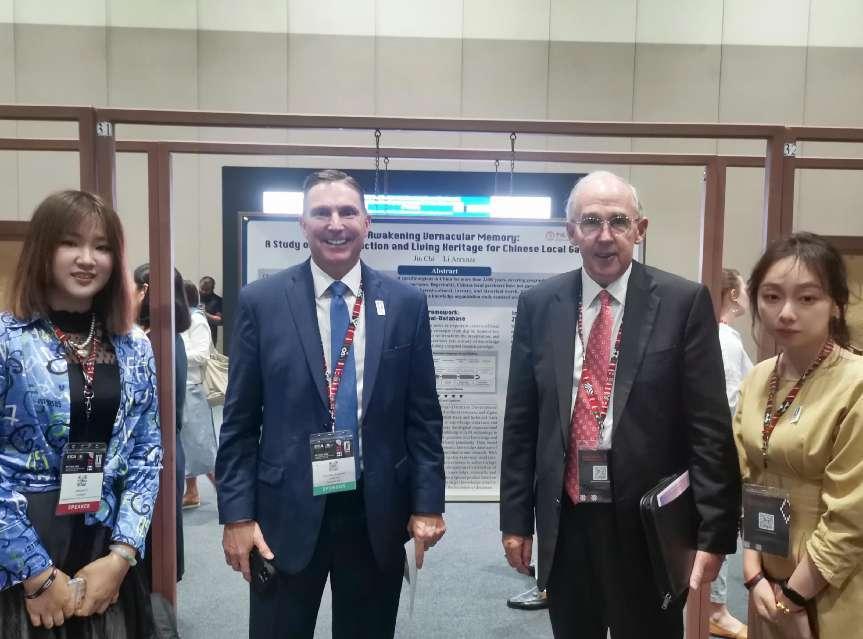
The Construction of Electronic Records Management Policy and Regulation Oriented to Single-track System in China: Development Process Investigation and Promotion Strategy
PhD student Yiwen Su and master’s student Yuqing Wang from Shanghai University jointly presented a poster titled The Construction of Electronic Records Management Policy and Regulation Oriented to Single-track System in China: Development Process Investigation and Promotion Strategy. Through literature survey and content analysis, the study summarized the characteristics and core themes of the construction of electronic records management policy and regulation oriented to single-track system in China, and found that there is still much room for improvement in the construction coordination, content rigidity, and front-end control requirements of the relevant electronic records policies and regulations in China. Based on this, further improvement strategies are proposed: constructing a coordinated development policy and regulation system; deepening the front-end control requirements of policies and regulations on document management activities; based on business drive, achieving widespread transformation of electronic records in multiple fields.
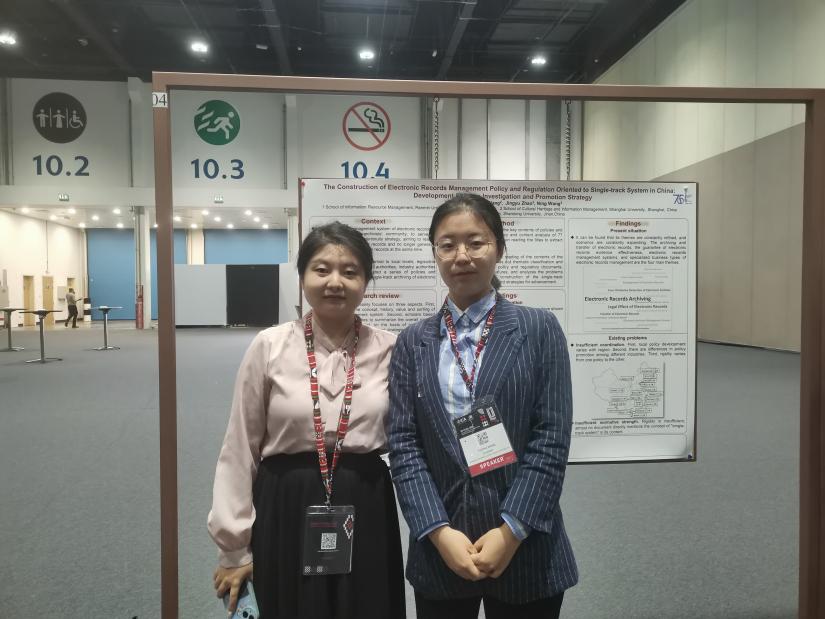
Building Information Resilience in The Archival Data Governance Process
The doctoral candidate Jiemin Pan presented a poster titled “Building Information Resilience in The Archival Data Governance Process.” The research compares the differences between information engineering resilience, information ecological resilience, and information evolution resilience based on the concept of information resilience. It elucidates the manifestation of data continuity, business continuity, and semantic continuity in information resilience, and proposes recommendations including strengthening data backups and institutional collaboration.
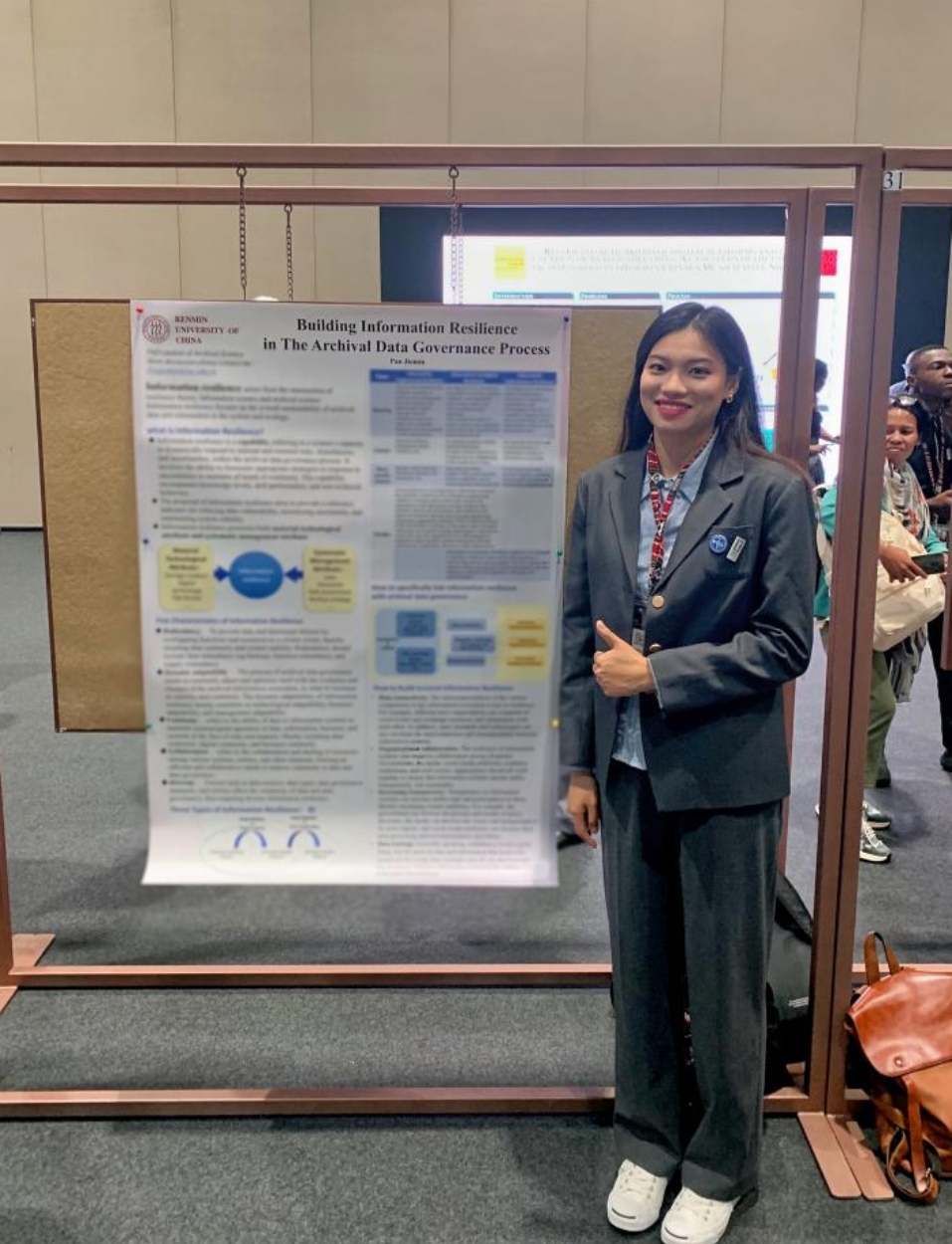
- Faculty from the School of Information Resource Management attended 2023 Annual Meeting of the International Electrotechnical Commission’s Smart City System Committee
- Faculty and Students of the School of Information Resources Management participate in the 2023 ICA International Congress on Archives
- The 20th China Information Resources Management Forum and the Inaugural Meeting of the Autonomous Knowledge System Alliance for Information Resources Management Discipline in China were successfully held
- The international publication of papers from the School of Information Resource Management (SIRM) at Renmin University of China, by teachers and students since June 2022
- Vice President WANG Yi visited the School of Information Resource Management for investigation
- Dr. Liang Jihong Lectured Online in Special Training Camp Series of Digital Memory
- Symposium on Community Informatics (CI) in Digital China was held by SIRM
- Associate Professor Rony Medaglia from Copenhagen Business School Gave A Cutting Edge Lecture: Digital Transformation in Government
- The International Frontier Teachers’ Lecture on the Theory, Principles and Methodology of ISO Terminology Standard Formulation was held successfully
- The 2019 Working Conference of Research Center for Humanistic Beijing was successfully held


